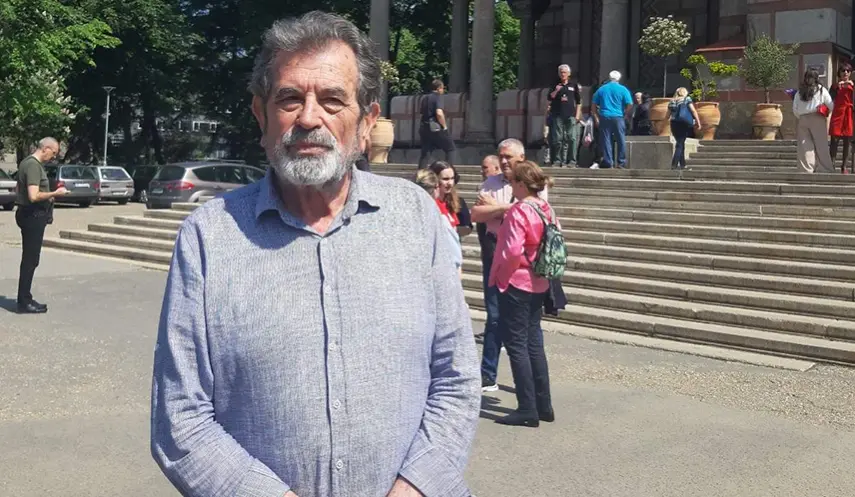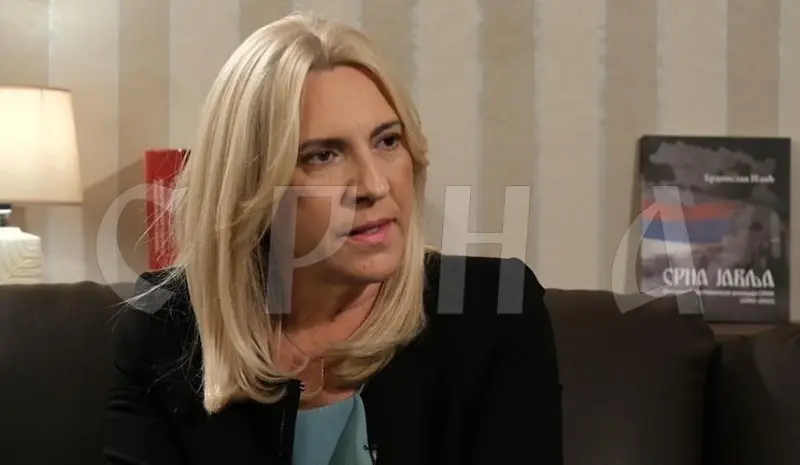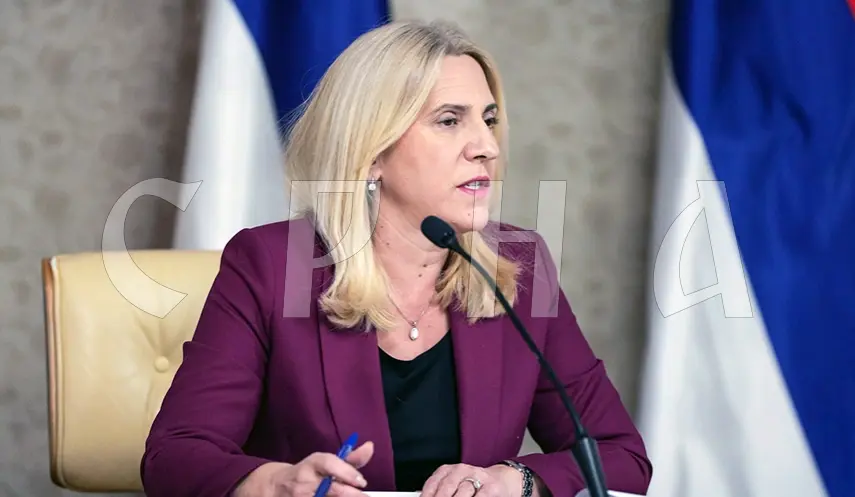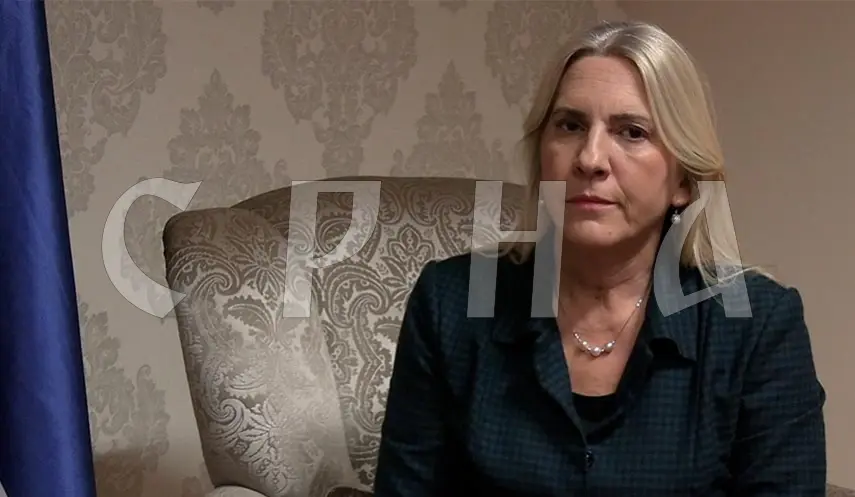ŠTRBAC: EVEN STONE WOULD WEEP AT THE TESTIMONY OF PARENTS OF CHILDREN KILLED ON PETROVAČKA ROAD
Serbia - region - trial
06/27/2025
19:25

BELGRADE, JUNE 27 /SRNA/ – Only someone with a heart of stone would not cry listening to today’s harrowing testimonies of Spaso Rajić and Jovanka Vuković about the deaths of their children on Petrovačka road, Savo Štrbac, President of the Documentation and Information Centre “Veritas”, told SRNA.
Commenting on today’s testimonies before the Special Department for War Crimes of the Higher Court in Belgrade, in the continued trial in absentia of four Croatian war pilots charged with crimes committed during Operation “Storm” in August 1995, Štrbac emphasized that this was the most heart-rending thing he has ever heard in his life, despite having long served as a judge and lawyer, and despite his work researching and documenting war crimes.
“Anyone who was present at the trial shed tears, because one must have a heart of stone not to cry after hearing Spaso Rajić’s testimony, whose two children were killed on Petrovačka road, and Jovanka, who lost her 13-year-old son and husband, killed in the same vehicle, in the same truck, where they found themselves by unbelievable circumstances,” said Štrbac.
He emphasised that only today did he learn that on that fateful day, Krstan Vuković was driving a truck loaded with food, specifically canned pâté, from Belgrade to Krajina. The remains of those tins are still at the memorial site of the crime, where on August 7, 1995, Croatian planes bombed the refugee convoy, killing 10 people, including four children, and injuring more than 50 others.
“When the grenade hit, those pâtés crackled like anti-personnel mines, which are also called ‘pâtés’. Krstan had waited 15 full days at the border to enter Republika Srpska from Serbia. That day, when the attack on Krajina began, he was finally allowed in, not knowing where his wife, children, and parents were,” Štrbac stated.
Meanwhile, Krstan’s wife Jovanka and daughter had gone to Banja Luka, while his son travelled by car with Krstan’s parents.
“When he saw what was happening, Krstan turned his truck around and headed along the route the refugee convoy was taking. He drove back towards Banja Luka and Serbia. He picked up his son Darko /13/, and then two children of his colleague Spaso Rajić – Nevena /11/ and Žarko /9/,” said Štrbac.
The children begged their father to let them ride in the truck so they could travel with Darko, whom they knew and went to school with.
“They all gathered, and Krstan’s father also got in, since they hadn’t seen Krstan for a long time while he was in Serbia. A direct grenade hit the truck, and all three children and Krstan were killed. The others were wounded. It was terrible to listen to today’s testimonies, especially that of Spaso Rajić, who clearly cannot forgive himself for allowing his children to leave him and go with their friend,” Štrbac pointed out.
He said it was hard to tell which part of Rajić’s testimony was more painful – his regret for letting his children ride with Krstan Vuković, or the fact that he did not even suspect what had happened while he was waiting for them at a roadside restaurant as agreed with Krstan. There, he saw the planes fly over and heard the explosion, but could not see that the grenade had struck the truck carrying his children, which he only learned later.
Jovanka Vuković, Štrbac said, searched for her husband Krstan and son Darko for a long time, unaware that their remains had been buried in Tomina, her husband’s birthplace.
She recounted that she left Banja Luka, where she was at the time, as soon as she heard something had happened, wandering from hospital to hospital hoping her loved ones were alive and that she would find them.
“This lasted until her brother-in-law told her that no one survived in the truck Krstan was driving, and that they had gathered only a few bones that remained. She took those few bones, what was left of her husband and son, and took them to Apatin to bury them. Only later did she learn that their remains were in Tomina. Their story is horrifying, and it is a shame there was no camera to capture it,” Štrbac assessed.
He stressed that he has never before heard such harrowing stories with such tragic consequences and so much pain in the parents of the slain children who testified
“The worst part is that they themselves feel guilty for letting their children go, as if blaming themselves and regretting that they did not die with them. That is the conclusion that arises from what they recounted,” Štrbac said.
He believes that at the continuation of the trial, scheduled for September 15, everything must be done to ensure that all witnesses appear, as three summoned witnesses did not appear today, citing various reasons such as living in Germany or Croatia and fearing repercussions for their testimony.
All of this, he said, is understandable, but he underlined that it is necessary for all witnesses who gave statements during the investigation to confirm what they said in court, as it is crucial for the trial to be transparent and leave no room for “loopholes” that Croatia could exploit, even though it has so far done nothing to begin prosecution for the crimes committed by its citizens, which is why they are being tried in absentia in Belgrade.
Štrbac again appealed to all witnesses to respond to court summonses to testify in Belgrade, because enormous effort has been invested just to begin the trial for the crimes on Petrovačka road and in Svodna near Novi Grad, where three people were killed in an airstrike on a refugee convoy on August 8, 1995, so that those responsible are prosecuted.
The indictment for the crimes on Petrovačka road and in Svodna has been raised against Croatian Air Force members Vladimir Mikac /67/ from Ptuj, Zdenko Radulj /69/ from Osijek, Željko Jelenić /69/ from Pula, and Danijel Borović /64/ from Varaždin, on reasonable suspicion of committing war crimes against the civilian population.








